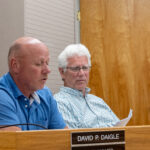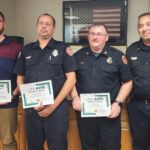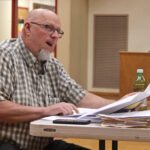On a frigid night last Thursday, the Hope and Justice Project met for their annual vigil and walk at the Gateway Crossing Park. Before the event began, participants enjoyed hot apple cider and cookies.
“Every year for Domestic Violence Awareness Month in Houlton, we’ve had a tradition of a vigil and walk, which has been very well attended by the community,” said Francine Garland Stark, director of the Hope and Justice Project.
Garland Stark noted it was an opportunity each year to take time to remember all of the people who have been killed in the last year as a result of domestic violence homicides, as well as those from years before, while also remembering the numbers of people who are currently suffering from domestic violence in their homes, “but [it is also an opportunity] to also celebrate those who have survived. Those who have escaped and gone on to have full violence free lives,” she added.
“It’s when we bring together volunteers, survivors, partners in community to reaffirm the work we are doing,” she said. “There is all together too much killing and too much violence. All of us are part of creating a community, which we can really make that be history, instead of present moment.”
Maine State Police Troop F Commander Ltn. Mark Brooks was the guest speaker for the event and called each person to action, as everyone has a role in stopping domestic violence.
“Here in Maine, while we conduct this vigil and walk, we will have arrested another criminal who attempts to intimidate and use violence as a way to gain the upper hand in a relationship before the sun sets again, perhaps right here, somewhere in Aroostook County,” he said. “Unfortunately, we will arrest another person who has assaulted another and be charged with domestic assault. I am always bothered by the ones we don’t find though.”
Brooks noted that events like the Hope and Justice Project vigil and walk are important to the community.
“I can’t tell you how many times, as well as the other law enforcement officers here, would agree, we’ve arrested someone for domestic violence only to have the spouse recant the story at a later date because of the fear, perhaps,” he said. “She fears her husband or is totally dependent on him. She just feels she can’t make that break to get out of a violent situation.”
But, Brooks reminded those gathered that domestic violence is a “senseless act” creating heartache, emotional issues, certainly fear, economic uncertainty and many times dependence on the very person who caused the violence in the first place.
“This is where all of us come in,” he said. “For we have a role to play. That role is all of us willing to get involved. Too much is at stake for us not to become involved.”
As a hostage negotiator for the state of Maine, Brooks was called to the scene of the Lake residence in Dexter where a mother and her two children were being held by her estranged husband.
“For hours we negotiated at an empty house,” he said.
When the tactical team made entry, all four were found dead in the living room.
“The Lake homicides are testament that domestic violence occurs everywhere – it is in our bigger cities in Maine and certainly in our rural communities,” Brooks added. “It’s among our wealthy citizens. I’ve arrested a doctor in Somerset County and those who don’t have much at all. It crosses every social, political, religious and economic spectrum that makes up this great land we call Maine.
“We raise our voices against this violence and pledge that we do have a role to play,” he added. “A role where together we can make a difference … to be willing to speak truth in love and try to speak with someone we know who may be going through a domestic violence situation. To offer not only a word of encouragement, but each one of us being willing even to offer a bed in our own homes for their safety and security. That is where our roles become very real. When we are willing to help and give of our own time and our own resources to help a friend or loved one in need.”
Brooks said as police officers, deputies and troopers, together they dedicate themselves every day to protecting those who cannot protect themselves. The District Attorney, judiciary and Maine Social Services, along with the Hope and Justice Project “must all come together to serve as a safety net for those in our society who are abused.”
Brooks addressed those in attendance and asked each one to rededicate themselves to helping those in need, as well as to take time and consider the future.
“To the future when we can see these domestic violence statistics finally dropping and our efforts we know have made an impact,” he said. “All of us present here tonight have a reason why we are here. Whatever the reason maybe this event is a testimonial to all citizens in our area that we know domestic violence is a real, terrible disease in our culture and we pledge to continue to find ways to find a cure and try to heal those already affected by it.”
Leslie Gervais and Karan Wotton, Hope and Justice Project staff members, then read a story of a survivor and what the Hope and Justice Project staff did to help her and her son, after which, Russell Fitzpatrick sang, “You’ve Got A Friend.”
The names of those killed this year by domestic violence were remembered, each as a single flower fell from the Gateway Bridge into the Meduxnekeag River’s cold, dark waters.
“Our job is to be sure that they [victims] know there are services available to them and that they know that when they call out for help we will all be there to help and stand with them to be safe,” said Garland Stark.
She said with all the depressing news, it was important to celebrate particular things.
“In the last year, the Hope and Justice Project sheltered 68 families,” Garland Stark said. “More than half of those families are living in stable, permanent, long-term housing today and are safe and building safe futures for themselves.”
Others may still be in shelters or struggling against barriers.
“There is much more work to do, but there is reason to be hopeful and reasons to be sad,” Garland Stark added. “That makes us inspired to work harder and do more together, which is why we are all here.”
For more information or for help, call the Hope and Justice Project at 532-4004.
Presque Isle, ME
59
Clear
Houlton, ME
59
Clouds
Caribou, ME
61
Clear
Fort Kent, ME
58
Clouds
Change Location
- Presque Isle
- Houlton
- Caribou
- Fort Kent
© 2024 Bangor Publishing Company.







